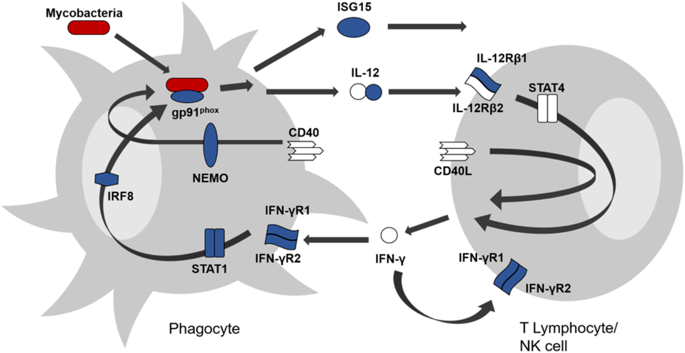当前位置:
X-MOL 学术
›
Genes. Immun.
›
论文详情
Our official English website, www.x-mol.net, welcomes your
feedback! (Note: you will need to create a separate account there.)
Primary immunodeficiency diseases in a tuberculosis endemic region: challenges and opportunities.
Genes and Immunity ( IF 5.0 ) Pub Date : 2018-09-06 , DOI: 10.1038/s41435-018-0041-0 Brigitte Glanzmann 1 , Caitlin Uren 1 , Nikola de Villiers 1 , Ansia van Coller 2 , Richard H Glashoff 2 , Michael Urban 1 , Eileen G Hoal 1 , Monika M Esser 2 , Marlo Möller 1 , Craig J Kinnear 1
Genes and Immunity ( IF 5.0 ) Pub Date : 2018-09-06 , DOI: 10.1038/s41435-018-0041-0 Brigitte Glanzmann 1 , Caitlin Uren 1 , Nikola de Villiers 1 , Ansia van Coller 2 , Richard H Glashoff 2 , Michael Urban 1 , Eileen G Hoal 1 , Monika M Esser 2 , Marlo Möller 1 , Craig J Kinnear 1
Affiliation

|
While individual primary immunodeficiency diseases (PIDs) are rare, collectively they represent a significant burden of disease. Recent estimates show that about one million people in Africa suffer from a PID. However, data from African PID registries reflect only a small percentage of the estimated prevalence. This disparity is partly due to the lack of PID awareness and the masking of PIDs by the endemic pathogens. Over three million tuberculosis (TB) cases were reported in Africa in 2016, with many of these from southern Africa. Despite concerted efforts to address this high burden of disease, the underlying genetic correlates of susceptibility to TB remain poorly understood. High penetrance mutations in immune system genes can cause PIDs that selectively predispose individuals to TB and other mycobacterial diseases. Additionally, the identification of individuals at a heightened risk of developing TB or of presenting with severe or disseminated TB due to their genetic ancestry is crucial to promote a positive treatment outcome. The screening for and identification of PID mutations in TB-endemic regions by next-generation sequencing (NGS) represents a promising approach to improve the understanding of what constitutes an effective immune response to TB, as well as the range of associated PIDs and phenotypes.
中文翻译:

结核病流行地区的原发性免疫缺陷疾病:挑战和机遇。
尽管个别的原发性免疫缺陷疾病(PID)很少见,但它们共同代表着很大的疾病负担。最近的估计显示,非洲约有100万人患有PID。但是,来自非洲PID登记处的数据仅反映了估计患病率的一小部分。这种差异部分是由于缺乏PID意识和地方病原体对PID的掩盖所致。2016年,非洲报告了超过300万例结核病,其中许多来自南部非洲。尽管人们为解决这一高疾病负担做出了共同努力,但对结核病易感性的潜在遗传相关性仍知之甚少。免疫系统基因中的高外显率突变会导致PID,选择性地使个体易患结核病和其他分枝杆菌疾病。此外,鉴定由于遗传原因而具有发展为结核病或出现严重或弥漫性结核病风险较高的个体,对于促进积极的治疗结果至关重要。通过下一代测序(NGS)筛选和鉴定结核病流行地区的PID突变,是一种有前途的方法,可以增进人们对结核病有效免疫应答的构成以及相关PID和表型范围的了解。
更新日期:2019-11-18
中文翻译:

结核病流行地区的原发性免疫缺陷疾病:挑战和机遇。
尽管个别的原发性免疫缺陷疾病(PID)很少见,但它们共同代表着很大的疾病负担。最近的估计显示,非洲约有100万人患有PID。但是,来自非洲PID登记处的数据仅反映了估计患病率的一小部分。这种差异部分是由于缺乏PID意识和地方病原体对PID的掩盖所致。2016年,非洲报告了超过300万例结核病,其中许多来自南部非洲。尽管人们为解决这一高疾病负担做出了共同努力,但对结核病易感性的潜在遗传相关性仍知之甚少。免疫系统基因中的高外显率突变会导致PID,选择性地使个体易患结核病和其他分枝杆菌疾病。此外,鉴定由于遗传原因而具有发展为结核病或出现严重或弥漫性结核病风险较高的个体,对于促进积极的治疗结果至关重要。通过下一代测序(NGS)筛选和鉴定结核病流行地区的PID突变,是一种有前途的方法,可以增进人们对结核病有效免疫应答的构成以及相关PID和表型范围的了解。











































 京公网安备 11010802027423号
京公网安备 11010802027423号